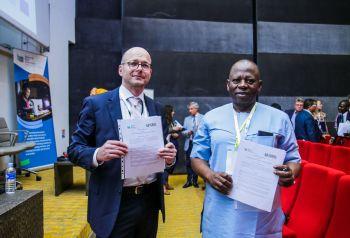Abidjan, 13 March 2019 – In light of the urgency to address the barriers hindering the roll-out of renewable energy, ARE and ECREEE have pledged to support SMEs and start-ups to upscale decentralised renewable energy and cross-sectoral collaborations in the ECOWAS region. They will do so by promoting sustainable energy policies, fit-for-purpose financing, innovative technologies and business solutions globally. The MoU was signed by Mahama Kappiah, ECREEE Executive Director and Marcus Wiemann, ARE Executive Director, on the occasion of the 5th ARE Energy Access Investment Forum in Abidjan on 13 March 2019.
Both parties agree that there is an emerging awareness on the technical and economic feasibility of exploiting the region’s huge renewable energy potential. As a consequence, ECREEE and ARE also acknowledge that these obstacles can be addressed if countries act in a more coordinated manner and that better harmonising and aggregating the demand for inter alia sustainable energy finance, technologies, innovation, capacity building across countries will provide a strong lever to lower costs, to improve quality and to bring reliable and cost-effective sustainable energy within the reach of all.
Marcus Wiemann, ARE Executive Director: “ARE is highly committed to contribute to the empowerment of the private sector who will be key to effectively deliver energy access in the ECOWAS region. The MoU is an important positive signal to those who wish to take action and will hopefully also be a convincing proof of how strong partnerships can help deliver on SDG7 goals.”
Mahama Kappiah, ECREEE Executive Director: “ECREEE will continue to establish robust partnerships that promote key financial, business and policy solutions to overcoming the major barriers to rural electrification efforts in West Africa.”
He expressed optimism that the MoU with ARE will not only go a long way in increasing access to electricity, but also ensure leapfrogging centralised electricity grids traditionally powered by fossil fuels to the use of renewable energy technologies and eventually putting these new energy consumers on a low carbon growth trajectory.

